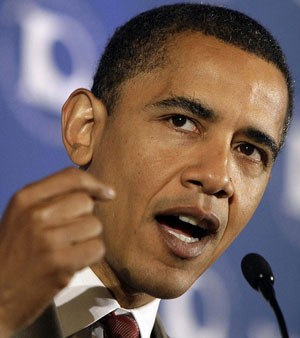ROUNDUP: Top bankers pledge cooperation with Obama on economy
 Washington - Some of the nation's top bank chiefs told President Barack Obama Friday that they would work with him towards the economic recovery, and agreed on the need for an overhaul of financial market regulations.
Washington - Some of the nation's top bank chiefs told President Barack Obama Friday that they would work with him towards the economic recovery, and agreed on the need for an overhaul of financial market regulations.
"Were all in this together," John Stumpf, the head of Wells Fargo & Co, was quoted as saying by Bloomberg financial news service after the meeting. "Were trying to do the right thing for America."
Obama was courting support from banking executives in an effort to transcend the furious standoff between the public and the industry over bailouts and bonuses and tackle the heart of the economic problems.
Robert Gibbs, Obama's spokesman, said the discussions began with the need for banks to sell their toxic assets under a new government programme aimed at loosening up credit.
The talks then moved to new restrictions on the financial industry proposed by Obama's administration over the past week, and to executive compensation, Gibbs said.
"There was next a discussion about regulatory reform. And it's fair to say that they agreed on the need to update the framework of regulation and that being important," Gibbs said.
Obama is pushing for banks to free up credit in proportion to the amount of money they have received from the government in its massive, trillion-dollar-plus rescue effort, but so far there has been little effect on credit availability.
He also faces a public angry over the way in which firms like American International Group (AIG) used public money to pay huge million-dollar-plus bonuses to its workers.
Obama discussed with the bankers the "importance of recognizing what the American public is going through in this economic crisis," Gibbs said. Unemployment has reached 8.1 per cent.
Also at the meeting were Jamie Dimon of JPMorgan Chase & Co., John Mack of Morgan Stanley, Vikram Pandit of Citigroup Inc. and Lloyd Blankfein of Goldman Sachs Group Inc.
Over the past week, Obama's administration has launched detailed plans to stabilize financial markets, including a huge programme to mop up toxic assets that are at the root of the worsening recession. The US government would subsidize private purchases of the bad assets to the tune of 75 to 100 billion dollars.
US Treasury Secretary Tim Geithner also signalled to Congress his plans to create more oversight for the non-banking financial industry - hedge funds, private equity firms and derivatives markets - that created shaky investment instruments for the bad mortgage assets.
But finance officials are chafing at the prospect of new restrictions similar to the ones that were brought in during the Depression of the 1930s which separated investment banking from commercial banking.
The scrapping of those rules, lifted in 1999, and of other regulations over the past two decades is blamed for allowing many of the excesses that led to the current US and world recession.
Its hard to turn back the clock" on the rules, Lloyd Blankfein of Goldman Sachs Group Inc was quoted as saying. dpa